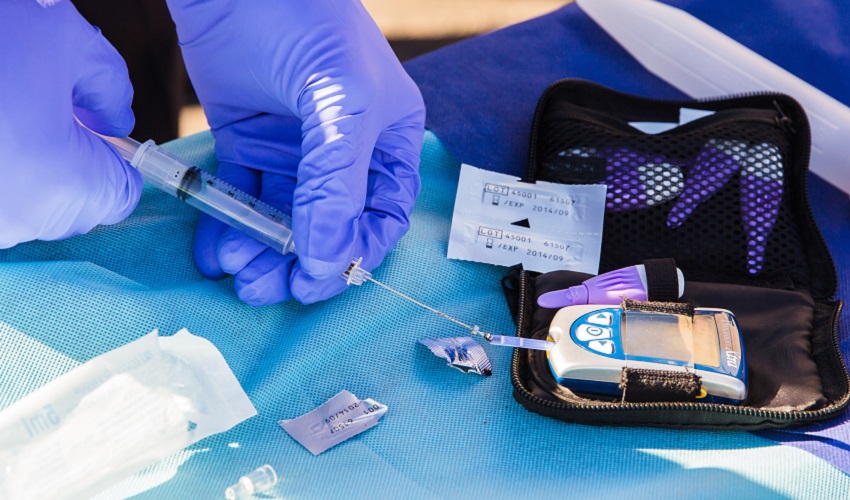Living with diabetes can present various challenges and impact one’s overall quality of life. However, by adopting regular self-care practices, individuals with diabetes can effectively manage their condition and improve their well-being. This article aims to provide valuable insights and information for diabetic patients and caregivers on the importance of incorporating self-care into their daily routines. By understanding the significance of self-care and implementing practical strategies, individuals can take control of their diabetes management and lead healthier, fulfilling lives.
Understanding Diabetes: A Brief Overview
Types of Diabetes
Diabetes is a chronic condition characterized by high blood sugar levels. There are primarily two types of diabetes: type 1 and type 2. Type 1 diabetes occurs when the body fails to produce insulin, requiring individuals to take insulin injections. Type 2 diabetes, on the other hand, involves insulin resistance, where the body doesn’t effectively use insulin or doesn’t produce enough insulin.
The Impact of Diabetes on Quality of Life
Living with diabetes can significantly impact an individual’s quality of life. It requires diligent management of blood sugar levels, adherence to medication regimens, and lifestyle modifications. Uncontrolled diabetes can lead to serious complications such as heart disease, kidney problems, nerve damage, and vision impairment.
What is Self-Care?
Defining Self-Care in the Context of Diabetes Self-care refers to the deliberate actions individuals take to maintain and enhance their health and well-being. In the context of diabetes, self-care involves managing blood sugar levels, making healthy lifestyle choices, adhering to medication regimens, and addressing emotional well-being.
Why Self-Care Matters
Self-care is crucial for individuals with diabetes as it empowers them to actively participate in their health management. It provides a sense of control, reduces the risk of complications, and improves overall quality of life. By engaging in self-care practices, individuals can better manage their blood sugar levels, prevent or delay complications, and improve their emotional and physical well-being.
Key Self-Care Practices for Diabetes Management
Healthy Eating and Meal Planning – proper nutrition is fundamental in diabetes management. Adopting a balanced diet that includes a variety of fruits, vegetables, whole grains, lean proteins, and healthy fats can help manage blood sugar levels and promote overall health.
Balanced Diets and Macronutrient Considerations
Consuming a balanced diet involves understanding the importance of carbohydrates, proteins, and fats. Carbohydrates impact blood sugar levels the most and should be monitored, while proteins and fats provide essential nutrients and contribute to satiety.
Portion Control and Glycemic Index
Practicing portion control helps regulate calorie intake and maintain stable blood sugar levels. Additionally, considering the glycemic index (GI) of foods can guide food choices by indicating how quickly they raise blood sugar levels.
Regular Physical Activity
Exercise offers numerous benefits for diabetes management. It helps lower blood sugar levels, improves insulin sensitivity, promotes weight management, reduces cardiovascular risk, and enhances overall well-being.
Benefits of Exercise for Diabetes
Management Engaging in regular physical activity can help individuals with diabetes achieve better blood sugar control, maintain a healthy weight, improve cardiovascular health, reduce stress levels, and enhance insulin sensitivity.
Types of Exercise and Recommendations
Both aerobic exercises (e.g., walking, cycling, swimming) and strength training exercises (e.g., weightlifting, resistance bands) are beneficial for diabetes management. Aim for at least 150 minutes of moderate-intensity aerobic activity per week, along with strength training exercises two or more days per week.
Blood Glucose Monitoring
Regular monitoring of blood glucose levels is essential for diabetes management. It helps individuals understand how their lifestyle choices, such as diet and physical activity, impact their blood sugar levels.
The Importance of Regular Testing
Monitoring blood glucose levels provides valuable information for making necessary adjustments to diet, physical activity, and medication regimens. It allows individuals to identify and address potential hypo- or hyperglycemic episodes promptly.
Understanding Blood Glucose Levels
Understanding target blood glucose ranges and interpreting self-monitoring results can aid in optimizing diabetes management. Collaborate with healthcare professionals to set individualized blood glucose targets and develop a monitoring schedule.
Medication Adherence
Adhering to prescribed medication regimens is crucial for managing diabetes effectively. Medications such as insulin or oral hypoglycemic agents help control blood sugar levels and prevent complications.
Importance of Following Medication Guidelines
Taking medications as prescribed ensures consistent blood sugar control and reduces the risk of complications associated with uncontrolled diabetes. Develop a routine, use reminders if necessary, and consult healthcare professionals for any concerns or difficulties.
Overcoming Barriers to Medication Adherence
Identifying and addressing potential barriers to medication adherence, such as forgetfulness, side effects, or financial constraints, are essential. Collaborate with healthcare professionals to find suitable alternatives or solutions to overcome these challenges.
Stress Management and Emotional Well-being
Stress can significantly impact blood sugar levels and overall diabetes management. Prioritizing stress management and emotional well-being is vital for optimal diabetes control.
Recognizing the Impact of Stress on Diabetes
Stress hormones can raise blood sugar levels, making it essential to manage stress effectively. Additionally, diabetes-related stress and emotional challenges may arise due to the demands of self-care.
Coping Mechanisms and Relaxation Techniques
Engaging in stress-reducing activities like deep breathing, meditation, yoga, and seeking social support can help manage stress and promote emotional well-being. Find healthy coping mechanisms that work for you.
Regular Medical Check-ups and Diabetes
Education Regular visits to healthcare professionals and participating in diabetes education programs provide valuable guidance, support, and updates on diabetes management.
The Role of Healthcare Professionals
Collaborating with healthcare professionals ensures personalized care, regular monitoring, and adjustments to the treatment plan based on individual needs. Regular check-ups help identify and address potential complications promptly.
Diabetes Education Programs
Participating in diabetes education programs equips individuals with knowledge and skills necessary for effective self-care. These programs cover topics such as nutrition, physical activity, medication management, and emotional well-being.
The Benefits of Regular Self-Care Practices
Improved Blood Sugar Control
By adhering to self-care practices, individuals can achieve better control over their blood sugar levels, reducing the risk of hyperglycemia and hypoglycemia. This leads to improved overall diabetes management and reduces the likelihood of complications.
Prevention and Management of Complications
Regular self-care practices, including medication adherence, blood glucose monitoring, healthy eating, and exercise, help prevent or delay the onset of diabetes-related complications, such as cardiovascular disease, kidney disease, nerve damage, and vision problems.
Enhanced Overall Well-being and Quality of Life
Incorporating self-care practices into daily routines improves overall well-being. By managing blood sugar levels effectively, individuals experience increased energy levels, reduced fatigue, improved mental health, and an overall better quality of life.
Tips for Incorporating Self-Care into Daily Life
Setting Realistic Goals: Start small and set achievable goals that align with individual preferences and lifestyles. Gradual changes are more sustainable and promote long-term success.
Building a Supportive Network: Seek support from family, friends, or diabetes support groups. Having a supportive network can provide encouragement, accountability, and guidance throughout the self-care journey.
Creating a Routine: Establishing a consistent routine helps make self-care practices a habit. Set specific times for medication, meal planning, physical activity, and other self-care activities to maintain consistency.
Utilizing Technology and Diabetes Apps: Explore the use of diabetes management apps and technology tools. These can help with blood glucose monitoring, medication reminders, meal planning, exercise tracking, and accessing educational resources.
Overcoming Challenges and Barriers
Addressing Financial Limitations
Financial constraints may impact access to healthy food choices, medications, or healthcare services. Consult healthcare professionals and explore resources such as insurance coverage, assistance programs, and community services that can support diabetes management.
Managing Time Constraints
Busy schedules can make self-care challenging. Prioritize self-care activities, delegate tasks when possible, and find creative ways to incorporate physical activity and healthy eating into daily routines.
Dealing with Emotional Obstacles
Emotional well-being plays a vital role in diabetes management. Seek support from healthcare professionals, therapists, or support groups to address emotional challenges and develop effective coping mechanisms.
The Role of Caregivers in Supporting Self-Care
Caregivers play a crucial role in supporting individuals with diabetes. They provide assistance with medication reminders, meal preparation, emotional support, and facilitate access to healthcare services.
Collaborating with Healthcare Professionals
Caregivers should actively participate in healthcare appointments and seek guidance from healthcare professionals regarding self-care practices, medication management, and potential complications.
Promoting Open Communication
Maintaining open communication between individuals with diabetes and their caregivers is essential. Discuss challenges, concerns, and goals openly to ensure effective support and collaboration.
By recognizing the importance of regular self-care practices for diabetes management, individuals can take proactive steps towards achieving optimal health outcomes and improving their overall quality of life. Incorporating self-care into daily routines empowers individuals to effectively manage their blood sugar levels, prevent complications, and enhance their emotional well-being. With the support of caregivers and healthcare professionals, individuals with diabetes can navigate the challenges and embrace a self-care approach that fits their unique needs. Remember, self-care is a journey, and every small step counts towards a healthier and happier life.




